This is the third article in a series that looks at various BDS movements from around the world and the campaigns that these movements focus on.
As the Boycott, Divestment and Sanctions movements continue to make news around the world; many critics of the movement have questioned its effectiveness. Reports from both in and outside of Israel indicate that the movement has made very little impact on the Israeli economy, and suggests that it is unlikely to for the foreseeable future. However, In June 2015, the Financial Times cited the leak of a government report by Calcalist (a financial paper owned by the Yedioth Ahronoth Group) which stated that BDS could potentially cost Israel’s economy $1.4bn a year if the European Union implemented a plan to label goods exported from Israel that are produced in the occupied territories.
BDS supporters argue that both the movement (and criticism of the movement) are similar to the earlier boycotts of South Africa during its apartheid era and in the last few months, BDS movements from around the world have reported a number of successes, which has strained Israel’s international image.
In April, French multinational Veolia completed the sale of its water, waste, and energy activities in Israel, following a global campaign against the company’s role in illegal Israeli settlements.
The BDS movement in France started in 2009 after the Gaza war of 08-09. Operation Cast Lead was a three week offensive allegedly between Hamas and Israeli forces. The conflict was said to have resulted in between 1,166 and 1,417 Palestinian and 13 Israeli deaths.
Dror Warschawski from BDS France says that their organisation runs campaigns in all domains, depending on the news with regards to the situation in Palestine. Most recently the group has been very active against Orange (a French phone company) who they have asked to divest from Israel.
“It looks like after a long campaign they are hearing our call, they have not pulled out of Israel yet, but we hope that this will be done in the next two years or so,” Warschawski went further.
“Victory seems to be possible, especially after that of Veolia.”
Like BDS Brighton, BDS France too runs an ongoing campaign against SodaStream, a company that operates out of Israel with factories located in the West Bank.
“SodaStream will sponsor French events such as TV shows and exhibitions and we will write to the shows or companies to ask them to release SodaStream as a sponsor,” Warschawski added.
When it comes to supermarket protest actions against Israeli fruits and vegetables, the group will distribute leaflets. He says that this is an effective way to raise awareness in the general public about Palestine whilst they are grocery shopping.
“We also run campaigns where we ask French artists to refrain from performing in Israel, this seems to happen less and less often, which may be due to awareness spreading around,” Warschawski explained.
Academic Boycott
Warschawski notes that when it comes to academic boycotts it is difficult in France, because backlash from Zionist groups is strong and sometimes is better supported by the direction of universities than human rights groups.
“Just last week at Ben White’s conference on Palestine was cancelled at the last minute at the Toulouse University, but the conference took place anyway,” Warschawski said.
Ben White is a journalist, known for his work on the Arab-Israeli conflict. Across America, various student organisations have called for their universities to divest from Israel, however according to reports, this divestment has yet to occur.
However when it comes to sporting events, BDS France is able to run successful awareness campaigns as there is large media coverage at these events.
“Sports have been a surprise to me, with a lot of successful events and a lot of press, which is good for the campaign as a whole”.
An ongoing campaign that BDS France is in the process of conducting involves a petition that has received over 7500 signatures at this moment, The petition requests that the French government not buy Israeli manufactured drones for the French army.
Public reaction
Warschawski says that the issue of Palestine might not be breaking news to people, but people do become sympathetic to the cause when they become aware of the situation, when BDS France hosts public events.
“There are sometimes Zionist groups who will oppose us, but these are really minor incidents,” Warschawski continued.
“Unfortunately, even a few Zionists can be hard to deal with when they sue us, and we have to fight in court with many trials. We sometimes win the court cases, or lose on minor technical issues, but it’s a lot of wasted time, money and energy, all because a handful of people.”
Warschawski says that BDS France is spreading all over France. There are 24 local groups in 24 different cities.
“We also have some large national organisations supporting us for example ATTAC, and unions such as Solidaires and CNT, political parties such as NPA and Parti de Gauche and progressive Jewish groups such as UJFP,” Warschawski explained.
Activists believe that BDS is the best way for individuals to make a change in their real everyday practical life and at work.
“In France, like in other countries, BDS is debated as a strategy: some people and organisations are not in our collective because they refuse cultural and academic boycott for example, others will focus only on products coming from the 67 territories. But even those groups will call for “BDS” and will highlight this as the best possible action in solidarity with Palestinians,” Warschawski concluded. VOC






 WhatsApp us
WhatsApp us 

